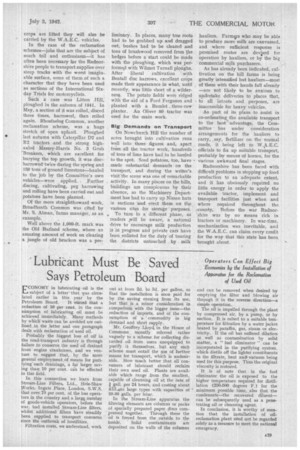Lubricant Must Be Saved Says Petroleum Board
Page 31

If you've noticed an error in this article please click here to report it so we can fix it.
ECONOMY in lubricating oil is the subject of a letter' that vas circulated earlier in this year by the
Petroleum Board. It stated that a reduction of 10 per cent. in the consumption of lubricating oil -must be achieved immediately. Many methods by which waste can be avoided are outlined in the letter and one paragraph deals with reclamation of used oil.
• Probably the biggest loss of oil in the road-transport industry is through failure to conserve the used oil drained from engine crankcases, and we venture to suggest that, by the more general employment of means for purifying-such drainings, a far larger saving than: 10 per cent. can be effected in this field.
In this connection we learn from Stream-Line Filters, Ltd., Hele-Shaw Works,. Ingate Place, London, S.W.8, that over 70 per cent, of the bus operators in the country and a large numbe,r of goods-vehicle operators, before the war, had installed Stream-Line filters, whilst additional filters have steadily been supplied to transport concerns since the outbreak of hostilities.
Filtration costs, we understand, work out at from 2d. to 3d. per gallon, so that the installation is soon paid for by the saving ensuing from its use, but that is a minor consideration in comparison with the bigger issue—the reduction of imports, and of the consumption of a ' commodity in big demand and short supply.
Mr. Geoffrey Lloyd, in the House of Commons recently referred rather vaguely to a scheme for collecting discarded oil from users unequipped to purifc it themselves, but any such scheme must entail the use of further means for transport, which is undesirable. How much better that all 'consumers of lubricant should reclaim their own used oil. Plants are available which range from the smallest, capable of cleansing oil at the rate, of I gal!, per 24 hours, and costing about £13,0to large types with capacities of 20-30 galls. per hour.
In the Stream-Line apparatus the filtering elements are columns or packs of specially prepared paper discs compressed together. Through these the oil is forced from the outside to the inside. Solid contaminants are deposited on the walls of the columns and can be removed when desired by emptying the filter and blowing air threugh it in the reverse direction—a Simple. operation.
The oil is impelled through the plant by compressed air, by a pump, or by suction. It is raised to a suitable temperature for filtration by a water jacket heated by paraffin, gas, steam or electricity. If the oil has suffered dilution as well as contamination by solid matter, a " fuel eliminator " can be incorporated in the purifying system, which distils off the lighter constituents in the filtrate, heat and vacuum being used for this Purpose. Thus the original viscosity is restored.
It is of note that in the fuel eliminator the oil is exposed to the higher temperature required for distillation (250-500 degrees F.) for the minimum possible time, also that the condensate—the recovered diluent— can be subsequently used as a penetrating oil or cleansing agent.
In conclusion, it is worthy of mention that the installation of oilreclamation plant need not be regarded solely as a measure to meet the national emergency.




















































